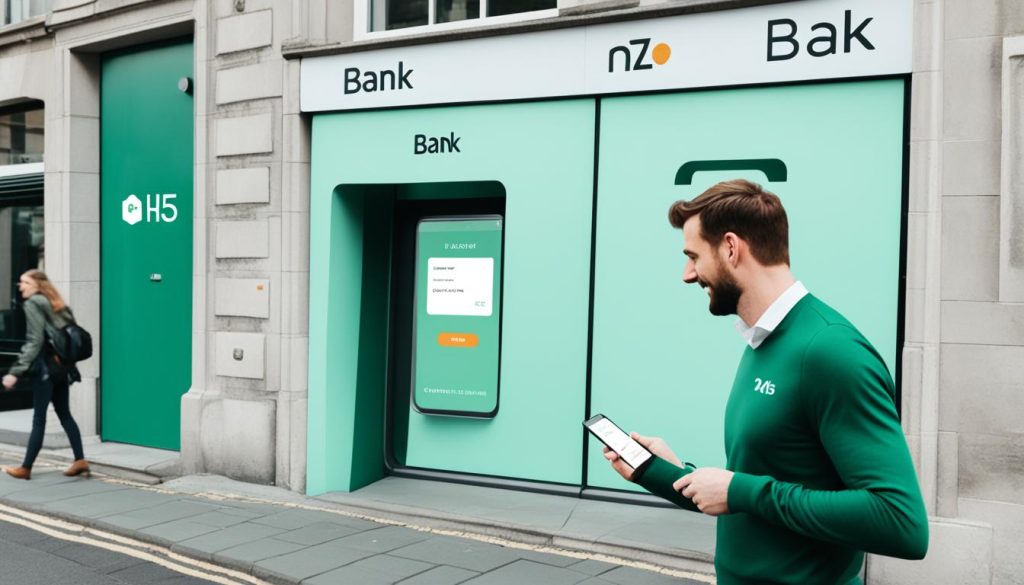Moving to Ireland is more than just a change of scenery. It’s a chance to dive into deep cultural roots and enjoy breath-taking views. For UK folks heading over, sorting out money matters is key. Luckily, opening a bank account in Ireland is pretty simple. You can even get started before you land.
Make sure you have your photo ID and a proof of address ready. This prep work makes opening your account easy. In Ireland, banks like Bank of Ireland, Allied Irish Banks (AIB), and Permanent TSB have accounts for different needs. If you’re looking for something flexible, Wise might be up your alley. They make dealing with pounds and euros a breeze.
Key Takeaways
- Opening an Irish bank account is an essential step when relocating to Ireland.
- The process can be started before arriving in Ireland.
- Have your photo ID and proof of address ready for a hassle-free experience.
- Bank of Ireland, Allied Irish Banks (AIB), and Permanent TSB offer varied account options.
- Alternative providers like Wise enable easy multi-currency management.
Why You Need an Irish Bank Account When Moving to Ireland
Moving to Ireland for work, study, or retirement? It’s key to open an Irish bank account. It makes financial transitions smooth there. You’ll need it for getting payments, handling taxes, and more. It’s crucial for buying property and everyday banking.
Having your own Irish bank account cuts down on fees for international banking. While SEPA lets you use other accounts, a local Irish one keeps things simple. You’ll save on hidden fees from foreign accounts. This makes settling financially in Ireland easier.
A local bank account connects you with Ireland’s economy directly. It streamlines banking needs, from shopping to moving into your new place. Setting up a local account means fewer hassles and full benefits of Irish banking.
Eligibility Requirements for UK Residents
If you’re a UK resident looking to open an Irish bank account, several key requirements exist. Knowing the difference between resident and non-resident banking is crucial. It makes the process easier.
Legal Age for Banking
You must be 18 or older to open a bank account in Ireland if you’re from the UK. This rule is the same for both types of accounts. You’ll need valid ID to prove your age and complete your application.
Resident vs Non-resident Accounts
For UK residents opening an account in Ireland, understanding the account types is important. Setting up a resident account is simpler, needing just proof of identity and address. But non-resident accounts may require more, like certified document copies.
Non-resident accounts are for those not living in Ireland yet. They need extra verification compared to resident accounts. For example, you often have to provide certified proof of address. This ensures you meet all local banking rules.
Necessary Documentation for UK Residents to Open an Irish Bank Account
UK residents looking to open an account in Ireland need specific documents. It’s vital to have the right paperwork for a smooth application.
Proof of Identity
Firstly, you must prove who you are to the bank. You can use a passport, driving licence, or an EU identity card. These are essential for your application.
Proof of Address
You’ll also need to provide evidence of your address. Recent utility bills, bank statements, or letters from the government are acceptable. Make sure these are no older than three months.
Certified Copies of Documents
Certified copies of identity and address proofs are also required. A solicitor or notary can confirm these are true copies. This step is crucial for the process.
If you’re not living in Ireland, you’ll need even more documents. This includes two address proofs and more ID documents. They should be in English and certified. Knowing these requirements helps make opening an account easier.
Bank of Ireland Account Options

The Bank of Ireland is the oldest financial institution in Ireland. It offers many account types to fit different needs. You can choose from standard current accounts or ones made for students and kids.
If you want to save money, the Bank of Ireland has plenty of options. They provide accounts for all stages of your financial life. Whether you need a basic savings account or something for investing, they’ve got you covered.
Getting an account with the Bank of Ireland is easy and can be done online. Their online system is simple to use, perfect for those moving to Ireland. With their selection of current and savings accounts, managing your money is easier than ever.
No matter if you’re looking for a straightforward current account or a more complex savings option, the Bank of Ireland is reliable for all your banking. They are a dependable choice for many.
Allied Irish Banks (AIB) Account Options
Allied Irish Banks (AIB) has a wide variety of banking services. Known for strong digital banking, it offers an easy and quick way to open accounts online. This makes AIB a top choice for online banking in Ireland.
Current Account with AIB
The AIB Current Account fits your daily banking needs. It includes online and mobile banking for tracking transactions and transferring funds easily. With features like contactless payments and overdrafts, you can manage your money online in Ireland.
Savings Account with AIB
AIB’s Savings Account gives good interest rates to grow your savings. It also has special accounts for students and senior citizens, to meet their unique needs. Plus, there’s a Sterling account, perfect for handling GBP, adding more flexibility to its digital banking services in Ireland.
Permanent TSB Banking Services
Permanent TSB has a key role in Ireland’s financial history. It offers innovative personal and business banking products. It’s known for blending digital banking solutions into its services, giving users convenient and modern banking experiences.
The Explore Account stands out. It combines traditional banking with digital banking solutions. This account is for tech-savvy customers. It provides digital banking and rewards. This ensures a rewarding banking experience tailored to fit your lifestyle.
Permanent TSB also offers Teen and Student Accounts, promoting financial literacy early on. These accounts show Permanent TSB’s dedication to meeting diverse customer needs. They show their focus on customer-centred banking.
If you want manageable digital banking solutions or an account that grows with you, Permanent TSB has many options. They cover various life stages and financial ambitions.
How to Open an Irish Bank Account Online
Nowadays, the convenience of opening an Irish bank account online is unbeatable. But, you need to follow some steps carefully. These ensure you successfully register for online banking and verify your bank account.
Online Verification Process
The online verification involves a few important stages:
- Submission of Certified Document Copies: You need to upload scans of ID documents, like your passport and address proof.
- Video Call or Selfie Verification: For extra security, some banks may ask for a video call or a selfie with your documents.
- Final Approval: Once your documents are reviewed, the bank gives the final nod for your online banking access.
Relevant Bank Websites
Several Irish banks offer online account creation on their sites. These platforms walk you through the account verification. They provide clear instructions and all the forms you might need:
- Bank of Ireland: Offers full guidance online, even for those living abroad.
- Allied Irish Banks (AIB): The website is straightforward to use for applying and verifying your details remotely.
- Permanent TSB: Their process is welcoming for both locals and international folks.
These resources aim to make online banking registration easy and secure for everyone.
In-Branch Account Opening Steps

When you open a bank account in person, you get a personal touch and more services. Knowing the steps for an in-branch account opening is crucial if you’re preparing to visit a bank.
Making an Appointment
The first thing is to arrange an appointment at a local branch. You can do this by calling or visiting the bank’s website. You’ll need to give some basic details to secure your appointment.
Documents to Bring
Gathering the right documents is key for your bank appointment. You will need:
- One piece of photo ID, like a passport or driver’s licence.
- A proof of address, such as a utility bill or rental agreement.
You may need more documents depending on where you live. Having the right papers ready makes the process quicker and easier.
Non-resident Account Opening Procedures
Opening a bank account as an expatriate is more demanding than for residents. To apply for a non-resident account, be ready to provide extensive documents. This helps speed up the process.
Additional Documentation Needed
For a non-resident account, banks often ask for:
- Two forms of identification, such as a passport and driving licence.
- Two proofs of address, which could be recent utility bills or bank statements.
Certified Translations
If your documents are not in English, they need certified translations. Making sure your documents are properly translated is vital. A registered translator or an official should do this. It makes the non-resident account application smoother and easier for expatriates.
Costs and Fees for Maintaining an Irish Bank Account
Knowing what it costs to keep an Irish bank account is important for your money management. There are a few main types of costs you’ll face. Each one affects how you feel about your bank differently.
Monthly Maintenance Fees
Irish banks often charge monthly or every three months for keeping your account. They take this money right out of your account. AIB is quite cheap for this, with a low yearly charge compared to others. When picking a bank, always look at these fees.
ATM Withdrawal Fees
You might also pay fees when you take out cash. Some banks let you do it for free, but others will charge you each time. Make sure you know your bank’s rules on getting cash to avoid surprise charges.
International Transfer Fees
Don’t forget about fees for sending money overseas. Banks usually add extra costs on top of the exchange rate. This makes sending money more expensive. Always check how much international transfers will cost. Sometimes, it’s cheaper to use a different service.
To save on bank fees in Ireland, remember these tips. This way, you can keep more of your money and not give too much to the bank.
Comparing Traditional Banks and Digital Bank Accounts
In today’s finance world, it’s key to compare traditional and digital banks. This helps you make a smart choice. Knowing the perks of both options lets you pick the best banking service.
Traditional Bank Benefits
Old-school banks like the Bank of Ireland and AIB offer lots. You get personal advice and can go into branches. This gives you stability and trust. But, they might charge more and be less flexible than digital banks.
Digital Bank Flexibility
Revolut and N26 stand out in the digital banking scene. Their apps are easy to use and packed with cool features. With lower fees and quick setup, they attract those who love tech. They provide convenience and efficiency on the go.
Alternative Providers
Companies like Wise have special offers for international dealings. They’re great for sending money abroad with low fees and good exchange rates. If you travel a lot or live overseas, their services are handy.
Using Wise for Managing Money Between UK and Ireland

If you’re moving money between the UK and Ireland, Wise is a great choice. It offers easy international money transfers. This is perfect compared to old-style banks.
Wise makes dealing with different currencies simple. It’s good for personal and business use. With support for over 40 currencies, it’s handy if you need to handle money in various countries. Using a multi-currency account helps you keep down conversion costs. You also avoid hidden fees common with traditional banks.
Wise is clear about its fees. You’ll know what you’re paying upfront. This clarity makes it a go-to for sending money abroad. It’s great for personal or business money moves. Wise makes managing your funds across borders easy, connecting the UK and Ireland with no hassle.
How Brexit Affects Your Irish Bank Account
Understanding Brexit’s effect on your Irish bank account is important if you’re a UK resident with cross-border finances. We will look at SEPA payments and rules, plus changes in bank account use after Brexit.
SEPA Payments and Regulations
The UK is still part of SEPA, which means money moves smoothly in euros. SEPA rules make sure businesses accept all EU-wide IBANs, stopping IBAN discrimination. This means Irish and UK bank accounts work well together.
Bank Account Usage Post-Brexit
After Brexit, using Irish bank accounts from the UK could lead to more checks and the need for extra information. Despite the constant SEPA rules, Brexit has introduced new steps for banks to follow. It’s key to keep up with these updates to make sure your money matters run smoothly.
Exploring Digital-Only Banks in Ireland
Digital-only banking is changing how we handle our money in Ireland. Platforms like Revolut and N26 are leading the way in app-based banking. They offer a modern and smooth banking experience.
These banks are all about easy-to-use apps, allowing you to open an account quickly. This is great for those who like fast and efficient banking.
One big bonus of these banks is they usually charge lower fees. This is because they don’t have the big costs that traditional banks do.
They come with cool digital features to suit today’s needs. This includes getting spending alerts in real-time and tools to help you budget. These features are handy in the digital era.
In Ireland, more people are picking these digital banks, like Revolut and N26. They’re not just different choices but are becoming the main ones for many.
Understanding E-money Licences vs. Banking Licences
In the world of finance, knowing about e-money and banking licences is key. These licences shape what financial institutions can do. Let’s dive into their differences.
Banking Licences Explained
Traditional banks get banking licences. This lets them be full-service banks. They can accept deposits, make loans, and offer investments. Banking licences come with strict rules to keep customer money safe. This often includes deposit insurance, protecting money up to a certain limit.
E-money Licences Explained
Fintech firms often get e-money licences. This lets them issue electronic money and offer services like money transfers and exchanging currencies. These licences don’t cover all bank activities, such as taking deposits or lending. Yet, e-money services must still follow strict regulations to ensure they handle money safely.
Both licence types are crucial in finance, serving different needs. By understanding these licences, you can better decide which institution suits your needs.
Opening a Bank Account with N26

Getting an account with N26 bank is simple, thanks to its user-friendly online process. This process is designed to remove the usual troubles of international banking. Once you’re registered, you immediately get a virtual card. This means you can manage your money without delay.
- Online registration: Quick and completely digital.
- Immediate access to a virtual card for online and contactless payments.
- Comprehensive financial management tools included.
One great thing about N26 bank is it gives you a German IBAN. For those doing banking across the European Union, this is very useful. It makes billing and payments smooth and easy. This is especially handy for people from other countries who need an account fast.
- German IBAN: Facilitates easy billing and payments within the EU.
- Ideal for non-residents needing fast account creation.
- Supports international banking with multiple currency accounts.
In short, N26 bank offers an ideal way for anyone to do banking across borders easily. It’s perfect for those looking for a dependable way to manage their finances and set up accounts quickly.
Managing Multiple Bank Accounts Across Countries
Having bank accounts in different countries can be helpful and sometimes needed. But, understanding international rules and sticking to them is essential. This makes sure your banking experience is smooth and legal.
International Regulations
When you bank in more than one country, you must follow many international rules. These rules are there to keep money safe and stop illegal activities like money laundering. Knowing and following these rules is key to avoid getting into trouble.
Compliance with AML and KYC Norms
AML and KYC norms are important in banking across borders. You need to provide clear documents and be completely transparent. This helps protect your money and makes banking in different countries easier.
Summary of the Best Banks for Your Needs
Choosing a bank in Ireland takes thought. Consider what you need and want first. Each bank has different perks for different needs. Here’s a guide to the top banks to assist in your decision-making process.
Bank of Ireland
The Bank of Ireland stands out for its large branch network. It’s great for those liking face-to-face service. They have lots of services like accounts, mortgages, and savings. Their customer care and local touch are big pluses.
Allied Irish Banks (AIB)
AIB shines with its vast array of accounts for personal and business use. They’re all about digital advances, with top-notch online and mobile services. AIB is great if you desire both new-age and classic banking.
Permanent TSB
Permanent TSB is user-friendly with good rates on their products. They have different banking options like accounts, loans, and insurance. It’s perfect for those who value straightforward and effective banking.
Digital Banks and Providers
Digital banks like N26 and Revolut offer a new way to bank online. They have low fees and great apps. Digital banks suit those who want flexibility and an easy banking experience.
In conclusion, whether you prefer traditional banks like Bank of Ireland, AIB, and Permanent TSB, or the digital approach, depends on your needs. Think about each choice to find what matches your financial goals and preferences.
Tips for Avoiding Common Banking Fees
To keep your banking costs down, here are some handy hints. These will help you cut common fees:
1. Maintain Minimum Balances: Avoid fees by keeping the required minimum balance in your account. Watching this balance helps keep costs low.
2. Use Bank-Specific ATMs: Using ATMs that belong to your bank prevents extra charges. This step makes managing your money easier.
3. Select Accounts with Beneficial Terms: Look for accounts with terms that suit you best. Especially those without many fees for usual transactions.
- Look into different banks and their fee setups.
- Think about choosing digital banks that usually charge less.
Follow these steps to manage your banking costs better. It leads to smarter account management.
How to Transition Smoothly to Using Your Irish Bank Account
Moving to an Irish account might seem overwhelming at first. But, taking a few steps can make it easier. Get to know the new banking system. This includes understanding the fees and digital services. Irish banks usually have different fees from UK banks. So, it’s important to check these to avoid surprises.
Firstly, talking to customer support is a key step. Most Irish banks offer great support to help you understand your account. Don’t be shy to ask about fees, online services, or making payments abroad. This can help save you both time and money.
Next, setting up mobile and online banking is crucial. These tools let you handle your money from anywhere. Be sure to install your bank’s app and sign up for online banking. This will give you features like making payments online, paying bills, and keeping track of your account.
Lastly, it’s essential to know about any rules for your new Irish account. This is really important if you’re going to make payments to other countries. Knowing these rules helps you follow AML (Anti-Money Laundering) and KYC (Know Your Customer) guidelines. This protects your money.







